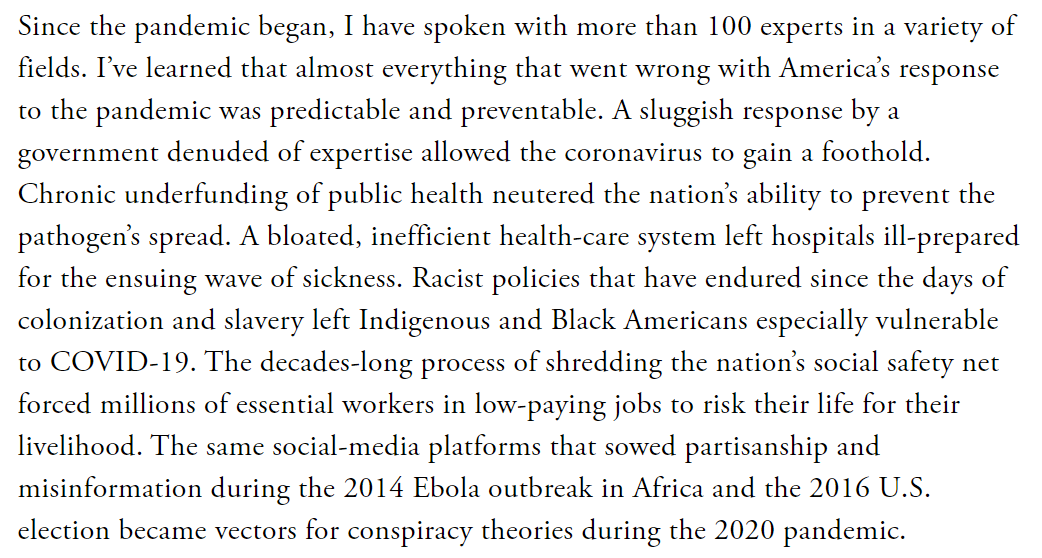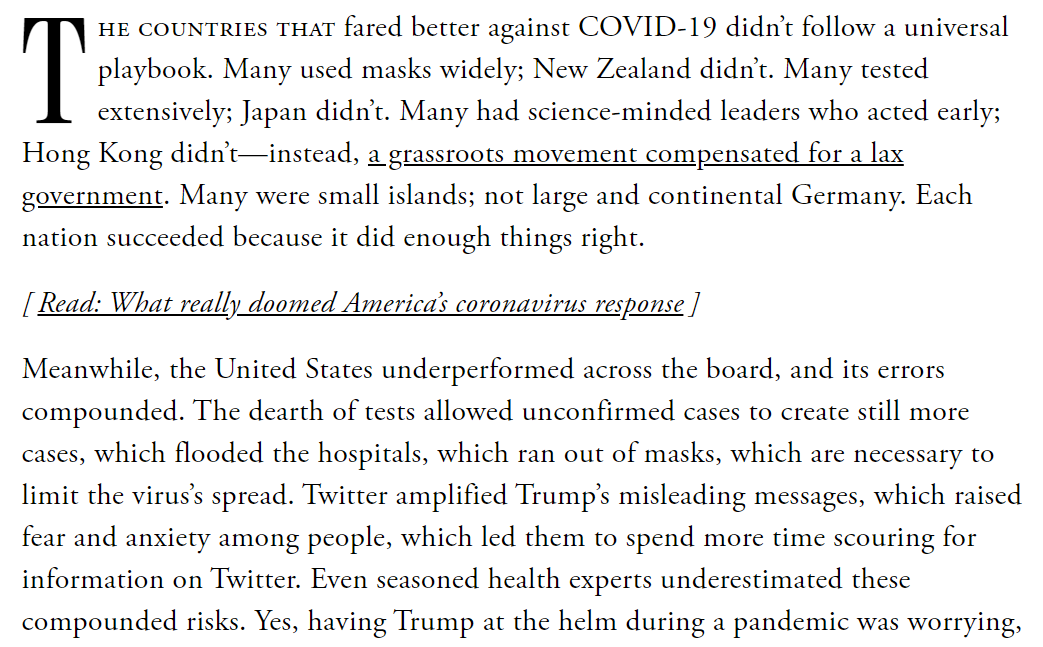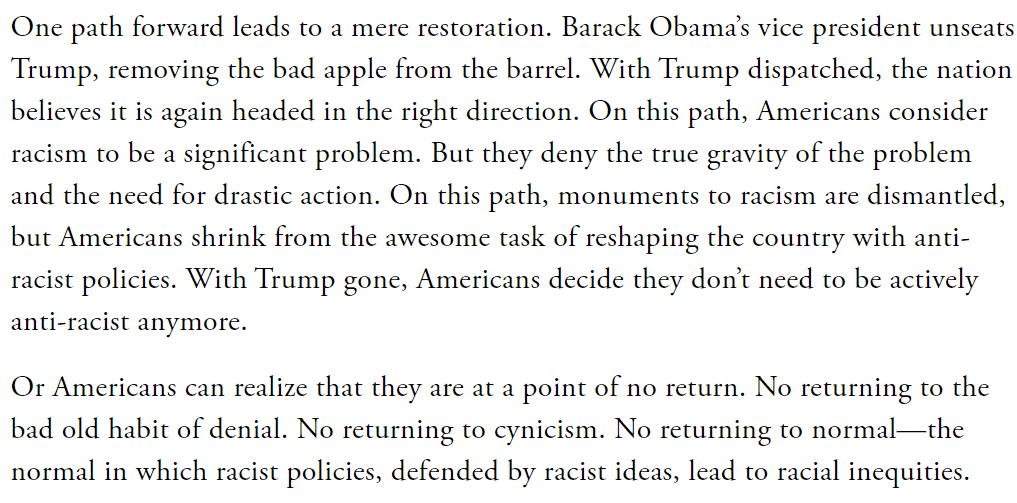The central idea behind this piece on why the US failed so badly to control the pandemic is that it fell under the combined weight of a multitude of weaknesses, every one of which was predictable.
I want to unpack that idea.
A thread. 1/ https://www.theatlantic.com/magazine/archive/2020/09/coronavirus-american-failure/614191/">https://www.theatlantic.com/magazine/...
I want to unpack that idea.
A thread. 1/ https://www.theatlantic.com/magazine/archive/2020/09/coronavirus-american-failure/614191/">https://www.theatlantic.com/magazine/...
This paragraph at the top hints at some of those weaknesses--all discussed, all left to fester. 2/
https://www.theatlantic.com/magazine/archive/2020/09/coronavirus-american-failure/614191/">https://www.theatlantic.com/magazine/...
https://www.theatlantic.com/magazine/archive/2020/09/coronavirus-american-failure/614191/">https://www.theatlantic.com/magazine/...
But I think that while everyone saw the cracks in their particular area, few people saw all the pieces--or weighted them correctly. Which is why we had pre-pandemic indices that assessed the US as the most prepared of all nations. 3/
(From March: https://www.theatlantic.com/health/archive/2020/03/how-will-coronavirus-end/608719/)">https://www.theatlantic.com/health/ar...
(From March: https://www.theatlantic.com/health/archive/2020/03/how-will-coronavirus-end/608719/)">https://www.theatlantic.com/health/ar...
It& #39;s striking, e.g., how many books/features were written about pandemic preparedness & how many make zero mention of health inequalities as an *entirely obvious* magnifier. Including mine. Where& #39;s the inequalities section in this piece? Doesn& #39;t exist. 4/ https://www.theatlantic.com/magazine/archive/2018/07/when-the-next-plague-hits/561734/">https://www.theatlantic.com/magazine/...
The same could be said for the online misinformation problem. I& #39;m still thinking about what Renee diResta told me about the need for methods that catch emerging infodemics just as we have some for new diseases. 5/
(Back to the new cover story: https://www.theatlantic.com/magazine/archive/2020/09/coronavirus-american-failure/614191/)">https://www.theatlantic.com/magazine/...
(Back to the new cover story: https://www.theatlantic.com/magazine/archive/2020/09/coronavirus-american-failure/614191/)">https://www.theatlantic.com/magazine/...
Which brings me to That Sentence. Yes this is a list of Trump& #39;s many failings (and a paean to the semicolon) but note the recurring predictability theme: Trump has always shown us who he is, before, during, and after his election. 6/
See, for example, this piece I wrote in Dec 2016, before his inauguration. At the time, someone wrote to me saying "This is ridiculous. I& #39;m no fan, but Trump& #39;s not going to let us die of Ebola." I guess the Ebola part was right. 7/ https://www.theatlantic.com/science/archive/2016/12/outbreaks-trump-disease-epidemic-ebola/511127/">https://www.theatlantic.com/science/a...
So: lots of problems, all foreseen by some and unattended by most.
This bit& #39;s important. It& #39;s not that other countries did everything right, but that they did most things right. And by corollary, the US failed because it did most things wrong--and its errors are coupled. 8/
This bit& #39;s important. It& #39;s not that other countries did everything right, but that they did most things right. And by corollary, the US failed because it did most things wrong--and its errors are coupled. 8/
The piece that& #39;s linked in the middle of those paragraphs is this one by @zeynep, which *you should really read*. If there& #39;s any one piece that influenced my new one, it& #39;s this. 9/ https://www.theatlantic.com/technology/archive/2020/03/what-really-doomed-americas-coronavirus-response/608596/">https://www.theatlantic.com/technolog...
The point of this story, then, was to document as many of those weaknesses as possible. I don& #39;t claim to have got it all. But it& #39;s as full as accounting as I could manage in 8000 words. 10/ https://www.theatlantic.com/magazine/archive/2020/09/coronavirus-american-failure/614191/">https://www.theatlantic.com/magazine/...
Folks who responded to the headline with "It& #39;s easy: Trump", or some other equally witty variant, are spectacularly missing the point. And are still looking away from the many systemic problems at hand. 11/ https://www.theatlantic.com/magazine/archive/2020/09/coronavirus-american-failure/614191/">https://www.theatlantic.com/magazine/...
. @DrIbram makes a similar point in his amazing story, with which mine shares the cover. (Pairing these was a really smart editorial move.) 12/
https://www.theatlantic.com/magazine/archive/2020/09/the-end-of-denial/614194/">https://www.theatlantic.com/magazine/...
https://www.theatlantic.com/magazine/archive/2020/09/the-end-of-denial/614194/">https://www.theatlantic.com/magazine/...
"COVID‑19 is an assault on America’s body, and a referendum on the ideas that animate its culture. Recovery is possible, but it demands radical introspection."
This is the choice: Look away and behind, or inward and ahead.
Choose. /Fin https://www.theatlantic.com/magazine/archive/2020/09/coronavirus-american-failure/614191/">https://www.theatlantic.com/magazine/...
This is the choice: Look away and behind, or inward and ahead.
Choose. /Fin https://www.theatlantic.com/magazine/archive/2020/09/coronavirus-american-failure/614191/">https://www.theatlantic.com/magazine/...
PS. Several ppl have said to me they& #39;re not feeling up to reading this yet. To that:
- It& #39;s not an easy topic; take care of yourself first.
- I& #39;ve tried to make the writing as lyrical as possible to compensate.
- There *is* a note of hope at the end. https://www.theatlantic.com/magazine/archive/2020/09/coronavirus-american-failure/614191/">https://www.theatlantic.com/magazine/...
- It& #39;s not an easy topic; take care of yourself first.
- I& #39;ve tried to make the writing as lyrical as possible to compensate.
- There *is* a note of hope at the end. https://www.theatlantic.com/magazine/archive/2020/09/coronavirus-american-failure/614191/">https://www.theatlantic.com/magazine/...

 Read on Twitter
Read on Twitter







